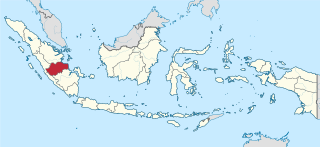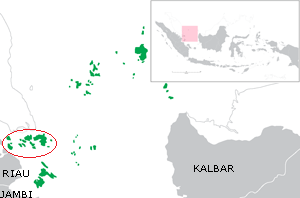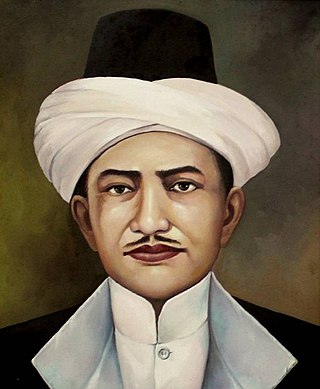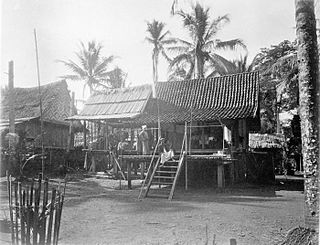This article needs additional citations for verification .(January 2013) |

Djambi Residency (Dutch : Residentie Djambi) was an administrative territorial entity of the Dutch East Indies and was established in 1906. [1]
Contents

This article needs additional citations for verification .(January 2013) |

Djambi Residency (Dutch : Residentie Djambi) was an administrative territorial entity of the Dutch East Indies and was established in 1906. [1]

Source: [2]
| Dutch Colonial Era | |||
|---|---|---|---|
| No. | Name | Took office | Left office |
| 1. | O.L. Helfrich | 1906 | 1908 |
| 2. | A.J.N. Engelenberg | 1908 | 1910 |
| 3. | Th. A.L. Heyting | 1910 | 1913 |
| 4. | AL. Kamerling | 1913 | 1915 |
| 5. | H.E.C. Quast | 1915 | 1918 |
| 6. | H.L.C Petri | 1918 | 1923 |
| 7. | C. Poortman | 1923 | 1925 |
| 8. | G.J. Van Dongen | 1925 | 1927 |
| 9. | H.E.K Ezerman | 1927 | 1928 |
| 10. | J.R.F Verschoor Van Niesse | 1928 | 1931 |
| 11. | W.S. Teinbuch | 1931 | 1933 |
| 12. | Ph. J. Van der Meulen | 1933 | 1936 |
| 13. | M.J. Ruyschaver | 1936 | 1940 |
| 14. | Reuvers | 1940 | 1942 |
| Indonesian Independence Era | |||
| No. | Name | Took office | Left office |
| 15. | Segaf Yahya | 1945 | 1945 |
| 16. | R. Inu Kertapati | 1945 | 1950 |
| 17. | Bachsan | 1950 | 1953 |
| 18. | Hoesin Puang Limbaro | 1953 | 1954 |
| 19. | R. Sudono | 1954 | 1955 |
| 20. | Djamin Datuk Bagindo | 1955 | 1957 |

Banten is the westernmost province on the island of Java, Indonesia. Its capital city is Serang and its largest city is Tangerang. The province borders West Java and the Special Capital Region of Jakarta on the east, the Java Sea on the north, the Indian Ocean on the south, and the Sunda Strait on the west and shares a maritime border with Lampung to the west. The province covers an area of 9,352.77 km2 (3,611.12 sq mi). It had a population of over 11.9 million in the 2020 census, up from about 10.6 million in 2010. The estimated mid-2023 population was 12.308 million. Formerly part of the province of West Java, Banten was split off to become a province on 17 October 2000.

Jambi is a province of Indonesia. It is located on the east coast of central Sumatra and stretches to the Barisan Mountains in the west. Its capital and largest city is also called Jambi. It is bordered by the provinces of Riau to the north, West Sumatra to the west, Bengkulu to the southwest, South Sumatra to the south, and shares a maritime border with the Riau Islands to the east and the Pacific Ocean to the east. The province has a land area of 49,026.58 km2, and a sea area of 3,274.95 km2. Its area is comparable to the European country of Slovakia. It had a population of 3,092,265 according to the 2010 census and 3,548,228 according to the 2020 census; the official estimate of population as of mid-2023 was 3,679,169.

Bengkulu, historically known as Bencoolen, is a province of Indonesia. It is located on the southwest coast of Sumatra. It was formed on 18 November 1968 by separating out the area of the historic Bencoolen Residency from the province of South Sumatra under Law No. 9 of 1967 and was finalized by Government Regulation No. 20 of 1968. Spread over 20,130.21 km2, its area is comparable to the European country of Slovenia and it is bordered by the provinces of West Sumatra to the north, Jambi to the northeast, Lampung to the southeast, and South Sumatra to the east, and by the Indian Ocean to the northwest, south, southwest, and west.

The Riau Archipelago is a geographic term for the core group of islands within the Riau Islands Province in Indonesia, and located south of Singapore and east of Riau on Sumatra. Before the province of Riau Islands was formed, there was no ambiguity in term; however, in Indonesian language, both the archipelago and administrative province are referred to simply as "Kepulauan Riau". The province may have the word "Provinsi" preceding it for clarity. Additionally, the term BBK for Batam Bintan Karimun may refer to the archipelago.
Jambi may refer to:

Jambi Malay, is a Malayic language primarily spoken by the Jambi Malay people in Jambi, Indonesia, but also spoken by migrants who have settled in Jambi. Jambi Malay is considered as a dialect of the Malay language that is mainly spoken in Jambi, but it is also used in the southern part of Riau and the northern part of South Sumatra. In Jambi, Jambi Malay has eight dialects, including the Tanjung Jabung dialect, Jambi City dialect, Muaro Jambi dialect, Batanghari dialect, Tebo dialect, Bungo dialect, Sarolangun dialect, and Merangin dialect. Jambi Malay is used as a lingua franca and for interaction among the various ethnic groups in Jambi. The differences between each dialect in Jambi Malay range from about 51 to 80 percent.

A Residency was an administrative division of:

The Battle of Palembang was a battle of the Pacific theatre of World War II. It occurred near Palembang, on Sumatra, on 13–15 February 1942. The Royal Dutch Shell oil refineries at nearby Plaju were the major objectives for the Empire of Japan in the Pacific War, because of an oil embargo imposed on Japan by the United States, the Netherlands, and the United Kingdom after the Japanese invaded China. With the area's abundant fuel supply and airfield, Palembang offered significant potential as a military base to both the Allies and the Japanese.

Sultan Thaha Syaifuddin Airport, formerly known as Palmerah Airport, is in Jambi City in the Jambi province of Indonesia. It is located in the Paalmerah suburb of Jambi. The airport is named after Thaha Syaifuddin, the last Sultan of Jambi (1816–1904).
The University of Jambi is a public university located in Jambi City, Jambi, Indonesia. The university was registered by Minister of PTIP decree Number 25 of 1963, as The State University of Jambi.

The Jambi uprising (1885) was a revolt in the Jambi Sultanate, modern Indonesia, which was put down by the Royal Netherlands Indies Army.

The Sino-Dutch conflicts were a series of conflicts between the Ming dynasty of China and the Dutch East India Company over trade and land throughout the 1620s, 1630s, and 1662. The Dutch were attempting to compel China to accede to their trade demands, but the Chinese defeated the Dutch forces.

The Jambi Sultanate, alternatively known as Djambi, was a sultanate that was centered in the modern-day province of Jambi in Indonesia.

Thaha Syaifuddin was the 20th and last Sultan of Jambi. He ascended the throne in 1855 succeeding his predecessor, Abdul Rahman Nazaruddin, and ruled until he lost the power struggle. After the demise of Sultan Zainul Abidin in 1900, Sultan Thaha Syaifuddin ascended to the throne for the second time until he died in 1904. His mother was Arab and he was fully literate, being able to read and write.

Napal Licin, sometimes written as Napal Litjin from the Dutch East Indies era, is a location in south Sumatra that was visited by European explorers at the end of the 19th century. A cave in the area, Napal Licin Cave, features stalactites and stalagmites and is a tourist attraction that can be reached by boat up the Rawas River, a tributary of the Musi River.

The Djambi class was a class of steam corvettes of the Royal Netherlands Navy. The class comprised Djambi, Zoutman, Willem, Leeuwarden, Metalen Kruis and Curaçao. Later two ships of a supposedly 'slightly revised' type were built, the Zilveren Kruis-class corvettes.

The Watergeus class was a class of screw sloop-of-war of the Royal Netherlands Navy. The class comprised the 'Watergeus' and the Marnix. A third ship that had been planned was cancelled.

The Zilveren Kruis class was a class of two steam-powered corvettes of the Royal Netherlands Navy. The class comprised Zilveren Kruis and Van Galen.

HNLMS Djambi was the lead ship of the Djambi-class, built for the Royal Netherlands Navy from the late 1850s. She was in the 1864 Shimonoseki affair and in the 1873 First Aceh Expedition. She became unfit for service after serving for only 13 years.

Central Sumatra was a province in Indonesia whose territories included present day West Sumatra, Riau, Jambi, and the Riau Islands. Since 1957 this province has not been registered as an Indonesian province after it was dissolved by Ordinance-as-Act No. 19/1957 and divided into the provinces of West Sumatra, Riau and Jambi through Law No. 61/1958 by the Sukarno government.